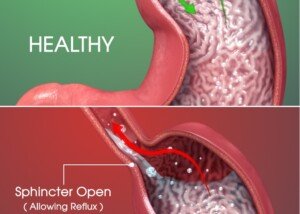
You already know acid reflux can sometimes cause problems with breathing, but just how does this happen in otherwise healthy people?
There’s more than one way that acid reflux—or the more serious variant, GERD, can interfere with breathing.
In acid reflux or gastroesophageal reflux disease, acid backs up into the esophagus, where it’s not supposed to go.
This can trigger a nerve reflex that then causes airways to constrict to keep out the acid, leading to interference with breathing.
“The most common way acid reflux interferes is by causing a cough,” begins Susan L. Besser, MD, with Mercy Medical Center, Baltimore, and Diplomate American Board of Obesity Medicine and board certified by the American Board of Family Medicine.
Dr. Besser continues, “This happens because as a person has reflux, stomach contents (including the acid) comes back ‘uphill’ into the esophagus (swallowing tube).
“This causes pain in the chest from direct contact of the acidic foods on the esophagus.
“Additionally, as the food substances travel, a small amount can spill over into the trachea (which anatomically is right next to the esophagus — the two tubes share a common pathway at the origin — back of the throat).
“So when food spills over, a person can aspirate (like you do when you swallow wrong) and can cough.
“Unlike simple mis-swallowing of foods, when you accidentally have the stomach contents spill over, you may not notice since it’s further down the passage — but may just start coughing.
“Over time, in some people this stomach contents can actually damage the bronchi (lung tubing) and can make asthma or COPD worse if you already have those conditions.”
When the airways are constricted or narrowed, you’ll feel a sensation of not getting in enough air even though you’re taking deep breaths.
You’ll feel a struggle to get in enough oxygen. You’ll sense a constriction of the airways.
This isn’t an “out of breath” feeling as you’d experience after running across a parking lot in the rain.
After a sprint, while you’re panting heavily, you can still feel a lot of air being taken in. There’s no sensation of a narrowed airway.
Another way that reflux or GERD can cause a feeling of “shortness of breath” or interfere with breathing in someone with healthy lungs is when the acid makes contact with the vocal cords.
Acid can make it to the throat without causing heartburn. When the throat’s chronically affected, the condition is called laryngopharyngeal reflux disease.
Think of this as GERD that affects the throat, though not all cases of acid contacting the throat mean that you have GERD or a full-fledged case of LPR. It may result from, for instance, transient but severe anxiety.
Quite frankly, LPR is notorious for interfering with breathing.
Something on the vocal cords, especially acid, can easily cause a sensation of troubled breathing.
 Dr. Besser provides comprehensive family care, treating common and acute primary conditions like diabetes and hypertension. Her ongoing approach allows her the opportunity to provide accurate and critical diagnoses of more complex conditions and disorders.
Dr. Besser provides comprehensive family care, treating common and acute primary conditions like diabetes and hypertension. Her ongoing approach allows her the opportunity to provide accurate and critical diagnoses of more complex conditions and disorders.
 Lorra Garrick has been covering medical, fitness and cybersecurity topics for many years, having written thousands of articles for print magazines and websites, including as a ghostwriter. She’s also a former ACE-certified personal trainer.
Lorra Garrick has been covering medical, fitness and cybersecurity topics for many years, having written thousands of articles for print magazines and websites, including as a ghostwriter. She’s also a former ACE-certified personal trainer.
.









































